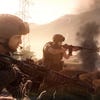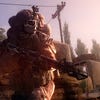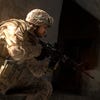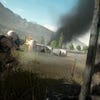Operation Flashpoint: Red River
Crimson tidings.
Call of Duty and its ilk are fairground-ride approximations of modern warfare. Their designers carefully arrange buildings, beams of sunlight and terrain to turn the head and draw the eye as you move along the rails. Explosions blast and enemies pop up as you pass through invisible triggers, only to be reset by the SFX team as soon as you're done, ready for the next tourist to gawp at.
These games are often exhilarating and absolutely deserve their place front-and-centre of mainstream gaming for their visceral, immediate thrills. But they are, nevertheless, a Disneyland rendering of contemporary combat. The primary emotion you feel travelling through the mechanical string of set-pieces is one of puff-chested power, rarely fear.
It would be senseless to imply that Operation Flashpoint, console gaming's only military sim series, is anything like real war. But the emotions the game elicits are undoubtedly more nuanced and realistic than those of its corridor-shooter cousins. There are still the invisible trigger points that cause enemies to burst out of buildings on cue. But in this world, ammo is scarce, bullets drop height the longer they are asked to fly, and there's no precision-engineered path through these wide-open desert spaces to bustle you mindlessly along to your next objective.
When your gruff-voiced Staff Sergeant barks down the headset to call in mortar fire on the farmhouse two clicks north – where a clutch of insurgents are holed up with AK47s and ideological issues with your uniform – you're more likely to scan the horizon with a keen sense of stress and panic. Which one of these identical huts that punctuate the landscape is the target again? Pick the wrong building and not only will you draw the fierce blue ire of your staff sergeant, but your Alpha squad companions could be blown all the way from Tajikistan to CNN.
The US Army caught a lot of flak for friendly fire in the Iraq war. But it's surprisingly hard to tell friendly from enemy when squinting through the noonday sun. And if you're playing Operation Flashpoint: Red River on 'hardcore', with the HUD rubbed out, no respawns or checkpoints, and nothing but your eyes and radios to count on for information, Red River introduces a sense of white-hot tension that is actually very rare in video games.
Likewise, when one of your squad mates screams "Sniper, 200 metres East" as a bullet wheezes unseen past your helmet, your immediate reaction is to dive behind a nearby wall, not to scan the rooftops in search of a vainglorious headshot. If you take a bullet, in this game your head will lunge violently to one side, incapacitating you for a few seconds before you can steady your aim again.
You'll also start bleeding out, a drain of strength that can only be stemmed by ducking into safety to apply bandages before mending your wounds, a two-stage healing process that takes you out of the fight for a full 15 seconds. In game terms, these are weighty punishments for a lack of due care and attention, and they make Infinity Ward's vision-clouding strawberry jam filter seem faintly ridiculous.
So realism is built into the Red River's code, but now – far more than in its predecessor Dragon Rising – it's written into its script too. It's clear Codemasters has feasted on a diet of contemporary war TV and cinema in arranging what turns out to be one of the strongest battle stories in gaming. There are echoes of HBO and David Simon's Generation Kill in the reams of dialogue that couch each fire team encounter here, while providing cover for an explosive ordnance disposal team attempting to disarm an IED in a car is lifted straight from The Hurt Locker. Missions are introduced by exquisitely produced motion-comic cut-scenes, but it's in-game where story and interaction meld with rare effectiveness.
It's a game of long, meandering walk and talks, not least since you play as a four-man infantry unit whose job is often to run ahead of Humvee convoys clearing roads. The constant radio chatter and banter back and forth between fireteams and the steadying voice of the staff sergeant have a keen authenticity.
Although you are constantly receiving orders and directions, this is still a game with wide-open play options. As well as controlling your own character, you can direct the other members of your fireteam, composed of a Rifleman, Auto-Rifleman, Grenadier and Scout.












